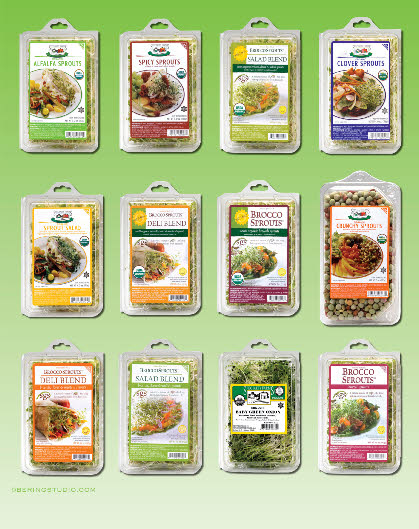Cleary et al., report in Eurosurveillance today the preliminary findings of the investigation of an outbreak of foodborne Salmonella Bareilly.
Between August and November 2010, there were 231 laboratory-confirmed reports of S. Bareilly in the United Kingdom. A case–control study showed that consumption of bean sprouts was significantly .jpg) associated with illness. The investigation concluded that raising public awareness to ensure the correct preparation of raw bean sprouts during cooking was the principal means of preventing further cases.
associated with illness. The investigation concluded that raising public awareness to ensure the correct preparation of raw bean sprouts during cooking was the principal means of preventing further cases.
Bean sprouts follow a complex path from farm to table that includes growing, harvesting, processing and shipping of mung bean seeds, followed by sprouting (normally at temperatures of 20-30 ºC with high humidity) and distribution of the finished product. Seeds may arrive already contaminated or contamination may occur at any point of production and distribution. As in previous outbreaks, this investigation concluded that the seeds were likely to have been contaminated, as investigations at suppliers found little potential for cross contamination of sprouted seeds.
Based on the experience of this investigation, the methodology used for routine microbiological quality control testing of bean sprouts may not be sensitive to low levels of Salmonella contamination. This may have implications for future testing protocols.?The bean sprouts implicated in this investigation were not ready to eat products and would be safe to eat if the instructions for correct preparation (washing and cooking until piping hot) were followed.
I still don’t know what piping hot is.

(1).jpg) times the number that the CFI would normally expect to see in that timescale. Health Protection Scotland identified 21 cases in the same period.
times the number that the CFI would normally expect to see in that timescale. Health Protection Scotland identified 21 cases in the same period.(1).jpg) New York,
New York, .story.jpg)
(1).jpg) Just cook it don’t cut it.
Just cook it don’t cut it. Health Canada used to say raw sprouts should be avoided if concerned about illness, but now they are more direct. That 2005 outbreak in Ontario involving more than 648 cases of Salmonella linked to mung bean sprouts may have something to do with the newfound directness.
Health Canada used to say raw sprouts should be avoided if concerned about illness, but now they are more direct. That 2005 outbreak in Ontario involving more than 648 cases of Salmonella linked to mung bean sprouts may have something to do with the newfound directness..jpg)

 choose to buy sprouts, they should “avoid musty-smelling, dark, or slimy-looking sprouts.”
choose to buy sprouts, they should “avoid musty-smelling, dark, or slimy-looking sprouts.”(1).jpg) The number of ill people identified in each state with this strain is as follows: AZ (2), CA (17), CO (1), ID (5), IL (1), MO (1), NM (1), NV (2), OR (2), PA (1), and WI (2). Among those for whom information is available about when symptoms started, illnesses began between March 1, 2010 and May 16, 2010. Case-patients range in age from <1 to 75 years old, and the median age is 36 years. Sixty-six percent of patients are female. Among the 30 patients with available hospitalization information, 7 (23%) were hospitalized. No deaths have been reported.
The number of ill people identified in each state with this strain is as follows: AZ (2), CA (17), CO (1), ID (5), IL (1), MO (1), NM (1), NV (2), OR (2), PA (1), and WI (2). Among those for whom information is available about when symptoms started, illnesses began between March 1, 2010 and May 16, 2010. Case-patients range in age from <1 to 75 years old, and the median age is 36 years. Sixty-six percent of patients are female. Among the 30 patients with available hospitalization information, 7 (23%) were hospitalized. No deaths have been reported..jpeg) Cook sprouts thoroughly to reduce the risk of illness. Cooking kills the harmful bacteria.
Cook sprouts thoroughly to reduce the risk of illness. Cooking kills the harmful bacteria. have been reported from 10 states since March 1, 2010. The number of ill people identified in each state with this strain is as follows: AZ (2), CA (14), CO (1), ID (3), IL (1), MO (1), NM (1), NV (2), OR (1), and WI (2). Among those for whom information is available about when symptoms started, illnesses began between March 1, 2010 and May 7, 2010. Case-patients range in age from <1 to 75 years old, and the median age is 32 years. Sixty-four percent of patients are female. Among the 20 patients with available hospitalization information, 6 (30%) were hospitalized. No deaths have been reported.
have been reported from 10 states since March 1, 2010. The number of ill people identified in each state with this strain is as follows: AZ (2), CA (14), CO (1), ID (3), IL (1), MO (1), NM (1), NV (2), OR (1), and WI (2). Among those for whom information is available about when symptoms started, illnesses began between March 1, 2010 and May 7, 2010. Case-patients range in age from <1 to 75 years old, and the median age is 32 years. Sixty-four percent of patients are female. Among the 20 patients with available hospitalization information, 6 (30%) were hospitalized. No deaths have been reported..jpg) On May 21, 2010
On May 21, 2010.jpg)